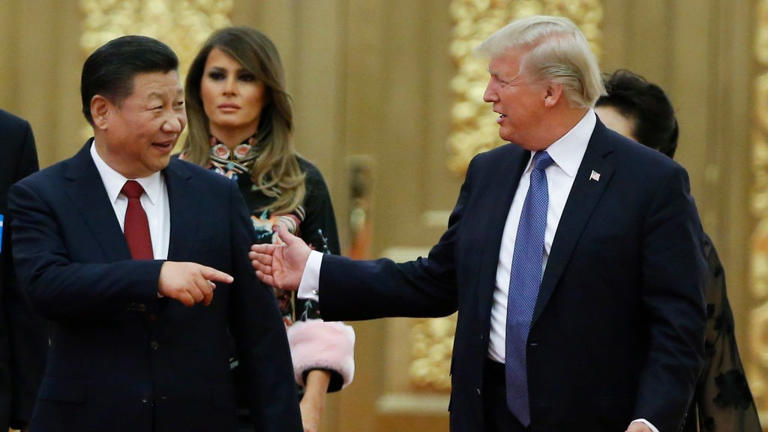Trump Hikes China Tariffs to 125% While Praising Xi as ‘Smart Guy’ in Bold Trade Strategy
In a dramatic escalation of the ongoing US-China trade war, President Donald Trump stunned global markets with a surprise policy maneuver—imposing a staggering 125% tariff on Chinese imports while simultaneously suspending tariffs for over 75 countries. This strategic shockwave came with rare praise for Chinese President Xi Jinping, whom Trump called “one of the smartest people in the world,” signaling a complex and calculated political strategy aimed at reshaping global trade dynamics in America’s favor.
Despite launching the most aggressive tariff hike against China to date, Trump struck a surprisingly conciliatory tone toward Xi, describing him as “a man who knows exactly what has to be done” and expressing confidence that the two leaders would eventually engage in direct talks. “Xi is a smart guy, and we’ll end up making a very good deal,” Trump told reporters, adding, “We will get a phone call at some point and then it’s off to the races.” His tone, though laced with optimism, came alongside a clear warning—reward for compliance and punishment for defiance.
The president’s unexpected decision to suspend tariffs on over 75 countries for a 90-day period was framed as an olive branch to US allies and trade partners that chose not to retaliate against earlier US tariffs. “I did a 90-day pause for the people that didn’t retaliate,” Trump explained. “Because I told them: if you retaliate, we’re going to double it – and that’s what I did with China.” The move was widely interpreted as a strategic bifurcation: isolate China economically while strengthening trade relationships with cooperative nations. The message from the White House was blunt and unmistakable: “Do not retaliate, and you will be rewarded.”
The impact on financial markets was immediate. After several days of declines, stock indexes surged on news of the tariff suspension, reflecting investor optimism about a potential de-escalation in global trade tensions—at least for countries not targeted by the latest wave of US tariffs. Treasury Secretary Scott Bessent confirmed the strategy was weeks in the making and described it as a “calculated play” to rally global partners while exposing China’s “bad actor” behavior. “You might even say that he goaded China into a bad position. They responded. They’ve shown themselves to the world to be the bad actors,” Bessent stated. He added that the US would reduce tariffs to a 10% baseline for non-retaliating countries, but China would face a crippling 125% rate.
China, however, responded swiftly and forcefully. In retaliation, Beijing announced its own dramatic tariff hike—raising duties on American goods to as high as 84%, a steep jump from the previous 34%. In addition, China filed a formal complaint with the World Trade Organization, accusing the US of undermining the rules-based global trading system. Beijing also escalated non-tariff measures, adding 12 US companies to its export control list and placing six others on its unreliable entities list.
The Chinese Finance Ministry condemned Washington’s move as “a mistake on top of a mistake” and warned of severe consequences for global trade stability. A white paper released by the Chinese government argued that the trade gap between the two economic superpowers is “inevitable” and claimed that overall trade was “roughly in balance,” dismissing the urgency of immediate negotiations with the United States. The paper emphasized that China would “fight to the end” in the trade dispute.
Despite the intense rhetoric and economic brinkmanship, President Trump continued to exude confidence in the US position, stating, “I think investing in the United States of America will be the greatest investment.” He further highlighted America’s military and economic strength before once again expressing his belief that President Xi would ultimately come to the negotiating table.
Top White House officials echoed that sentiment, portraying the tariff moves not as an act of aggression but as a strategic invitation for cooperation. “Every country in the world wants to come and negotiate,” said Bessent. “We are willing to hear you. We are willing to cooperate with our allies and with our trading partners who did not retaliate. It wasn’t a hard message – don’t retaliate, things will turn out well.”
This high-stakes trade maneuver has reset the global economic landscape, with Washington betting that a combination of pressure and selective relief will bring nations closer to its vision of fair and reciprocal trade. Whether this bold strategy will bring long-term gains or further fragmentation in international trade remains to be seen.
For video news, visit our YouTube channel THE OLIGO.

